How to be a responsible shopper





1 слайд
School: №11
Teacher :
Date: 21.12.2021
С lass: 10
Theme: How to be a
responsible shopper
Module 4. Organic and
non-organic worlds.
1 слайд
School: №11 Teacher : Date: 21.12.2021 С lass: 10 Theme: How to be a responsible shopper Module 4. Organic and non-organic worlds.
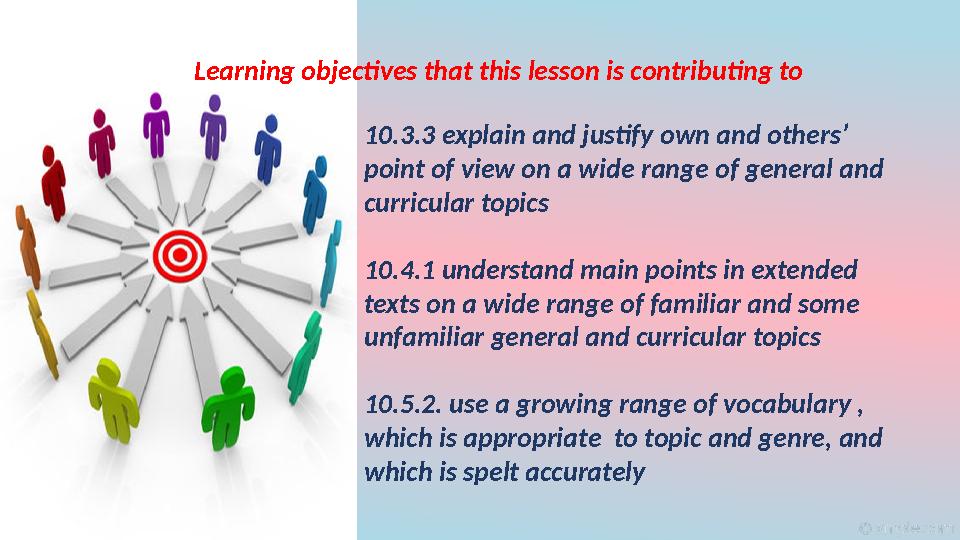
2 слайд
Learning objectives that this lesson is contributing to
10.3.3 explain and justify own and others’
point of view on a wide range of general and
curricular topics
10.4.1 understand main points in extended
texts on a wide range of familiar and some
unfamiliar general and curricular topics
10.5.2. use a growing range of vocabulary ,
which is appropriate to topic and genre, and
which is spelt accurately
2 слайд
Learning objectives that this lesson is contributing to 10.3.3 explain and justify own and others’ point of view on a wide range of general and curricular topics 10.4.1 understand main points in extended texts on a wide range of familiar and some unfamiliar general and curricular topics 10.5.2. use a growing range of vocabulary , which is appropriate to topic and genre, and which is spelt accurately
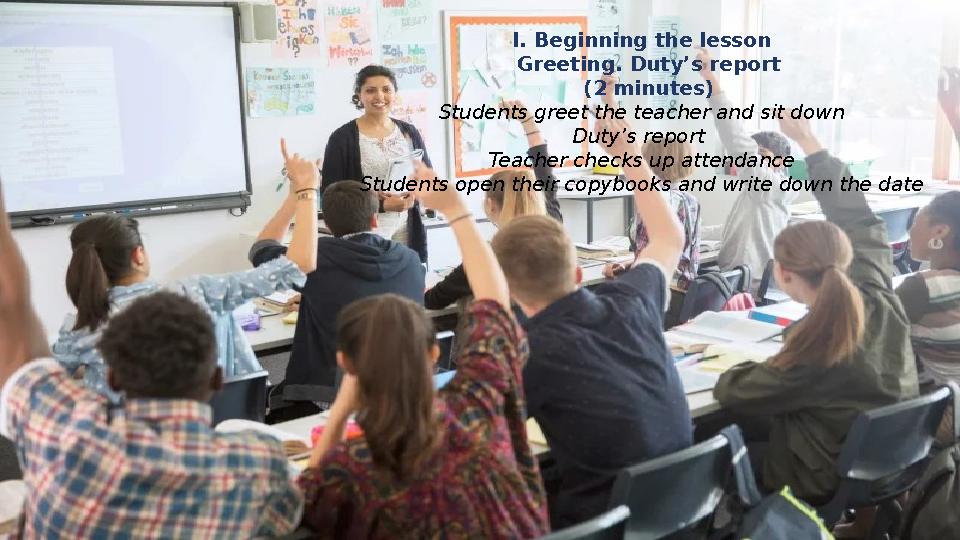
3 слайд
I. Beginning the lesson
Greeting. Duty’s report
(2 minutes)
Students greet the teacher and sit down
Duty’s report
Teacher checks up attendance
Students open their copybooks and write down the date
3 слайд
I. Beginning the lesson Greeting. Duty’s report (2 minutes) Students greet the teacher and sit down Duty’s report Teacher checks up attendance Students open their copybooks and write down the date
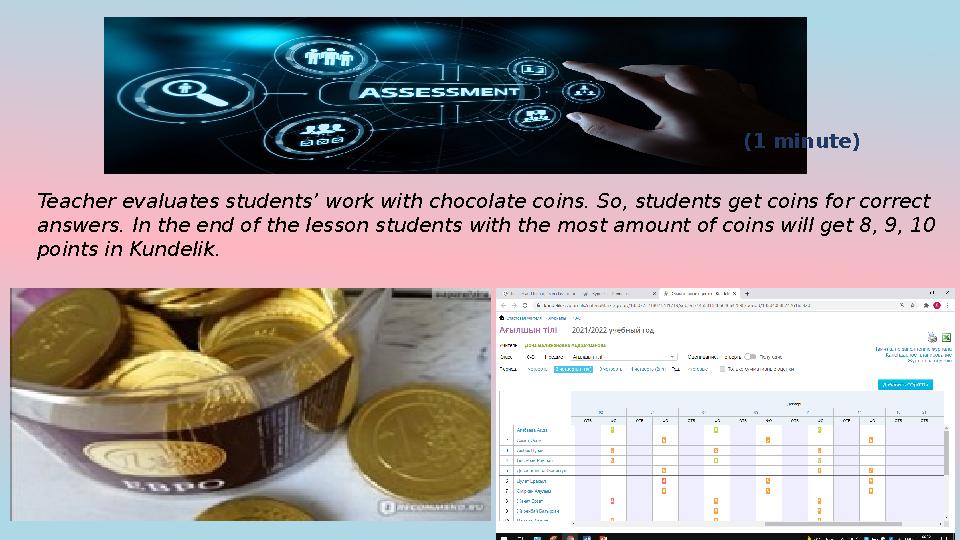
4 слайд
(1 minute)
Teacher evaluates students’ work with chocolate coins. So, students get coins for correct
answers. In the end of the lesson students with the most amount of coins will get 8, 9, 10
points in Kundelik.
4 слайд
(1 minute) Teacher evaluates students’ work with chocolate coins. So, students get coins for correct answers. In the end of the lesson students with the most amount of coins will get 8, 9, 10 points in Kundelik.
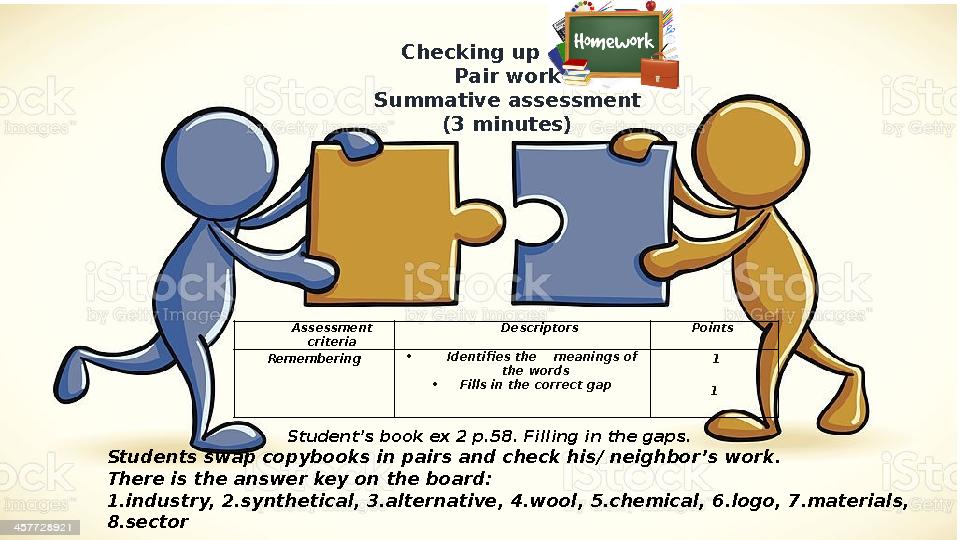
5 слайд
Assessment
criteria Descriptors Points
Remembering
Identifies the meanings of
the words
Fills in the correct gap 1
1 Checking up
Pair work
Summative assessment
(3 minutes)
Student’s book ex 2 p.58. Filling in the gaps.
Students swap copybooks in pairs and check his/ neighbor’s work.
There is the answer key on the board:
1.industry, 2.synthetical, 3.alternative, 4.wool, 5.chemical, 6.logo, 7.materials,
8.sector
5 слайд
Assessment criteria Descriptors Points Remembering Identifies the meanings of the words Fills in the correct gap 1 1 Checking up Pair work Summative assessment (3 minutes) Student’s book ex 2 p.58. Filling in the gaps. Students swap copybooks in pairs and check his/ neighbor’s work. There is the answer key on the board: 1.industry, 2.synthetical, 3.alternative, 4.wool, 5.chemical, 6.logo, 7.materials, 8.sector
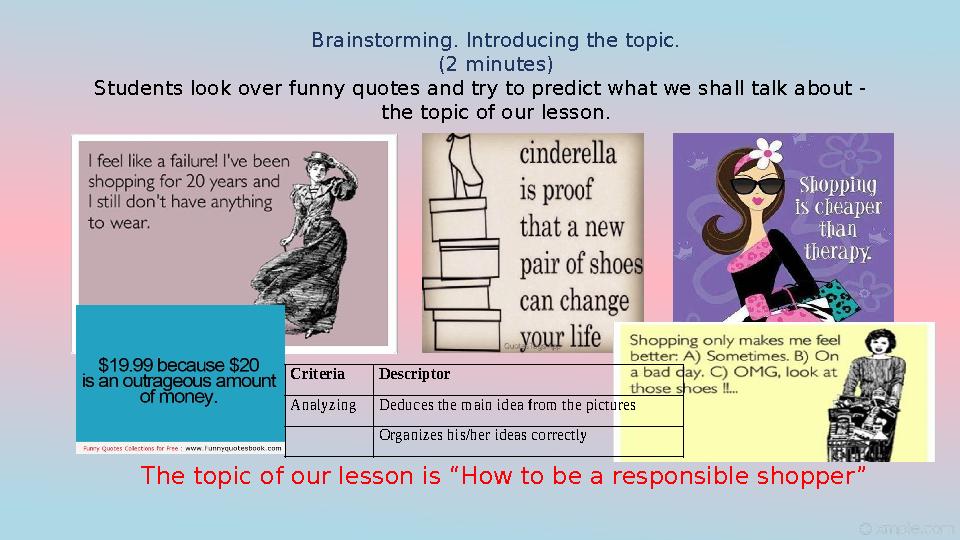
6 слайд
Brainstorming. Introducing the topic.
(2 minutes)
Students look over funny quotes and try to predict what we shall talk about -
the topic of our lesson.
The topic of our lesson is “How to be a responsible shopper” Criteria Descriptor
Analyzing Deduces the main idea from the pictures
Organizes his/her ideas correctly
6 слайд
Brainstorming. Introducing the topic. (2 minutes) Students look over funny quotes and try to predict what we shall talk about - the topic of our lesson. The topic of our lesson is “How to be a responsible shopper” Criteria Descriptor Analyzing Deduces the main idea from the pictures Organizes his/her ideas correctly
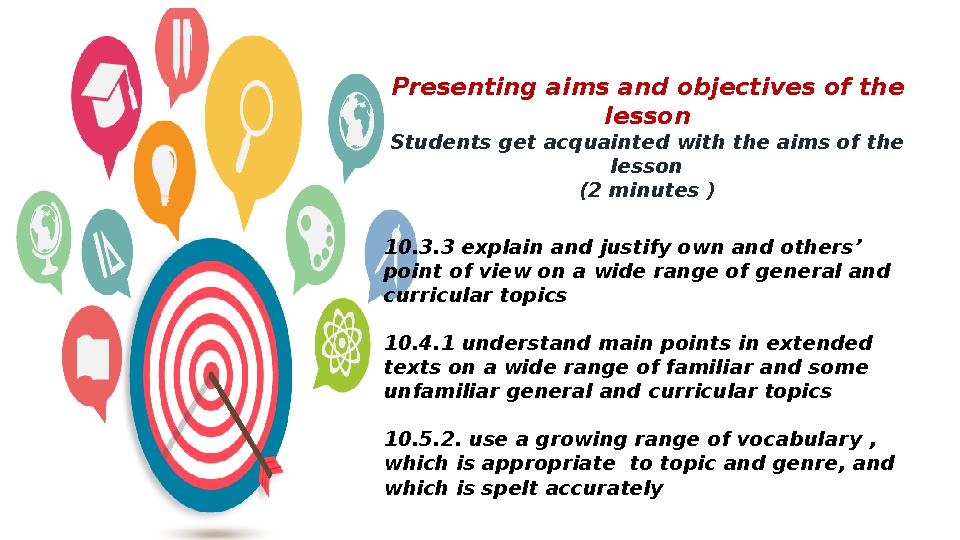
7 слайд
Presenting aims and objectives of the
lesson
Students get acquainted with the aims of the
lesson
(2 minutes )
10.3.3 explain and justify own and others’
point of view on a wide range of general and
curricular topics
10.4.1 understand main points in extended
texts on a wide range of familiar and some
unfamiliar general and curricular topics
10.5.2. use a growing range of vocabulary ,
which is appropriate to topic and genre, and
which is spelt accurately
7 слайд
Presenting aims and objectives of the lesson Students get acquainted with the aims of the lesson (2 minutes ) 10.3.3 explain and justify own and others’ point of view on a wide range of general and curricular topics 10.4.1 understand main points in extended texts on a wide range of familiar and some unfamiliar general and curricular topics 10.5.2. use a growing range of vocabulary , which is appropriate to topic and genre, and which is spelt accurately
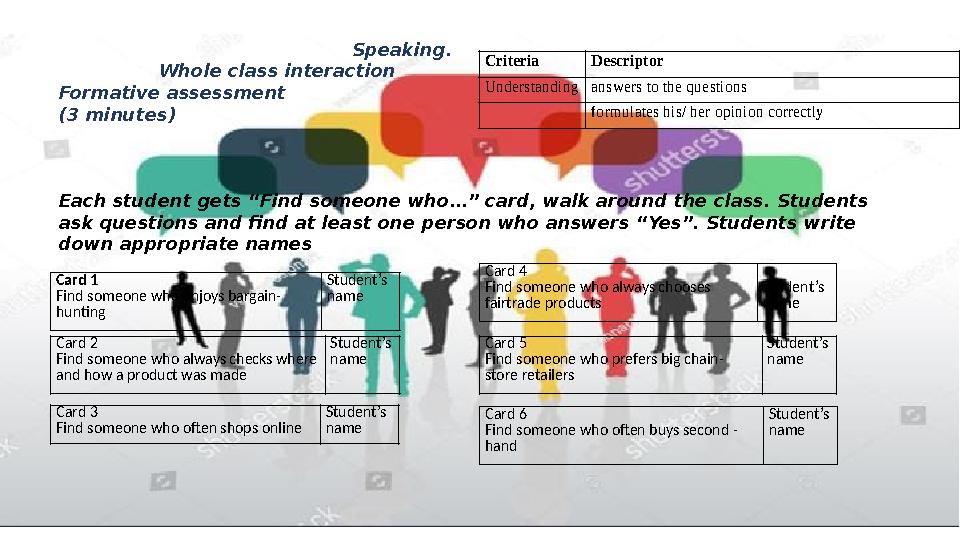
8 слайд
Speaking.
Whole class interaction
Formative assessment
(3 minutes)
Each student gets “Find someone who…” card, walk around the class. Students
ask questions and find at least one person who answers “Yes”. Students write
down appropriate names Criteria Descriptor
Understanding answers to the questions
formulates his/ her opinion correctly
Card 1
Find someone who enjoys bargain-
hunting Student’s
name
Card 2
Find someone who always checks where
and how a product was made Student’s
name
Card 3
Find someone who often shops online Student’s
name Card 4
Find someone who always chooses
fairtrade products
Student’s
name
Card 5
Find someone who prefers big chain-
store retailers Student’s
name
Card 6
Find someone who often buys second -
hand Student’s
name
8 слайд
Speaking. Whole class interaction Formative assessment (3 minutes) Each student gets “Find someone who…” card, walk around the class. Students ask questions and find at least one person who answers “Yes”. Students write down appropriate names Criteria Descriptor Understanding answers to the questions formulates his/ her opinion correctly Card 1 Find someone who enjoys bargain- hunting Student’s name Card 2 Find someone who always checks where and how a product was made Student’s name Card 3 Find someone who often shops online Student’s name Card 4 Find someone who always chooses fairtrade products Student’s name Card 5 Find someone who prefers big chain- store retailers Student’s name Card 6 Find someone who often buys second - hand Student’s name
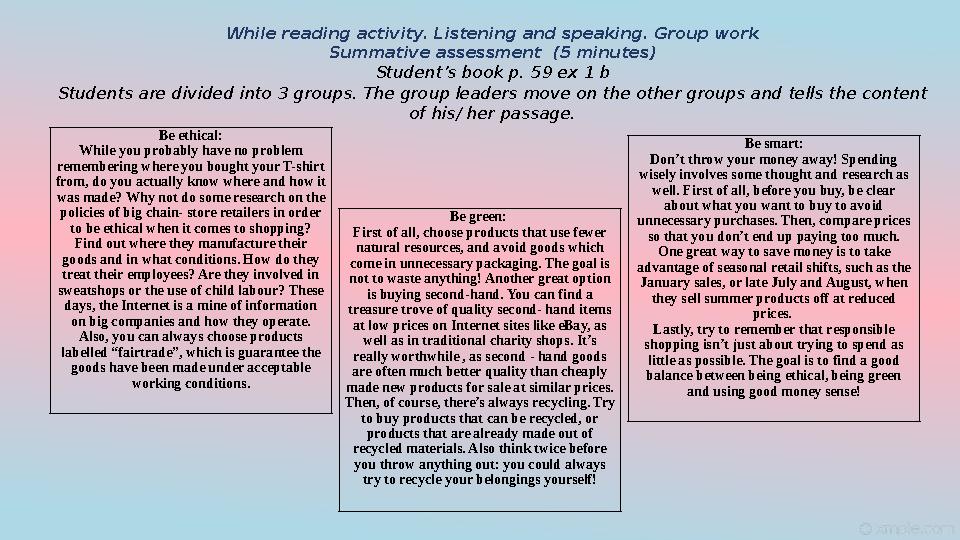
9 слайд
While reading activity. Listening and speaking. Group work
Summative assessment (5 minutes)
Student’s book p. 59 ex 1 b
Students are divided into 3 groups. The group leaders move on the other groups and tells the content
of his/ her passage.
Be ethical:
While you probably have no problem
remembering where you bought your T-shirt
from, do you actually know where and how it
was made? Why not do some research on the
policies of big chain- store retailers in order
to be ethical when it comes to shopping?
Find out where they manufacture their
goods and in what conditions. How do they
treat their employees? Are they involved in
sweatshops or the use of child labour? These
days, the Internet is a mine of information
on big companies and how they operate.
Also, you can always choose products
labelled “fairtrade”, which is guarantee the
goods have been made under acceptable
working conditions. Be green:
First of all, choose products that use fewer
natural resources, and avoid goods which
come in unnecessary packaging. The goal is
not to waste anything! Another great option
is buying second-hand. You can find a
treasure trove of quality second- hand items
at low prices on Internet sites like eBay, as
well as in traditional charity shops. It’s
really worthwhile , as second - hand goods
are often much better quality than cheaply
made new products for sale at similar prices.
Then, of course, there’s always recycling. Try
to buy products that can be recycled, or
products that are already made out of
recycled materials. Also think twice before
you throw anything out: you could always
try to recycle your belongings yourself! Be smart:
Don’t throw your money away! Spending
wisely involves some thought and research as
well. First of all, before you buy, be clear
about what you want to buy to avoid
unnecessary purchases. Then, compare prices
so that you don’t end up paying too much.
One great way to save money is to take
advantage of seasonal retail shifts, such as the
January sales, or late July and August, when
they sell summer products off at reduced
prices.
Lastly, try to remember that responsible
shopping isn’t just about trying to spend as
little as possible. The goal is to find a good
balance between being ethical, being green
and using good money sense!
9 слайд
While reading activity. Listening and speaking. Group work Summative assessment (5 minutes) Student’s book p. 59 ex 1 b Students are divided into 3 groups. The group leaders move on the other groups and tells the content of his/ her passage. Be ethical: While you probably have no problem remembering where you bought your T-shirt from, do you actually know where and how it was made? Why not do some research on the policies of big chain- store retailers in order to be ethical when it comes to shopping? Find out where they manufacture their goods and in what conditions. How do they treat their employees? Are they involved in sweatshops or the use of child labour? These days, the Internet is a mine of information on big companies and how they operate. Also, you can always choose products labelled “fairtrade”, which is guarantee the goods have been made under acceptable working conditions. Be green: First of all, choose products that use fewer natural resources, and avoid goods which come in unnecessary packaging. The goal is not to waste anything! Another great option is buying second-hand. You can find a treasure trove of quality second- hand items at low prices on Internet sites like eBay, as well as in traditional charity shops. It’s really worthwhile , as second - hand goods are often much better quality than cheaply made new products for sale at similar prices. Then, of course, there’s always recycling. Try to buy products that can be recycled, or products that are already made out of recycled materials. Also think twice before you throw anything out: you could always try to recycle your belongings yourself! Be smart: Don’t throw your money away! Spending wisely involves some thought and research as well. First of all, before you buy, be clear about what you want to buy to avoid unnecessary purchases. Then, compare prices so that you don’t end up paying too much. One great way to save money is to take advantage of seasonal retail shifts, such as the January sales, or late July and August, when they sell summer products off at reduced prices. Lastly, try to remember that responsible shopping isn’t just about trying to spend as little as possible. The goal is to find a good balance between being ethical, being green and using good money sense!

10 слайд
The lesson is over.
Thank you for your attention!
Good bye!
10 слайд
The lesson is over. Thank you for your attention! Good bye!















